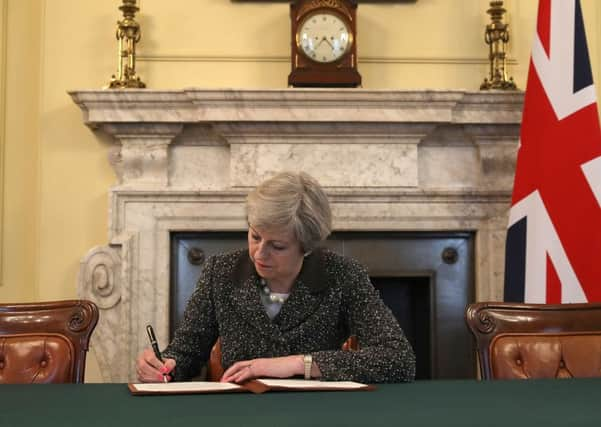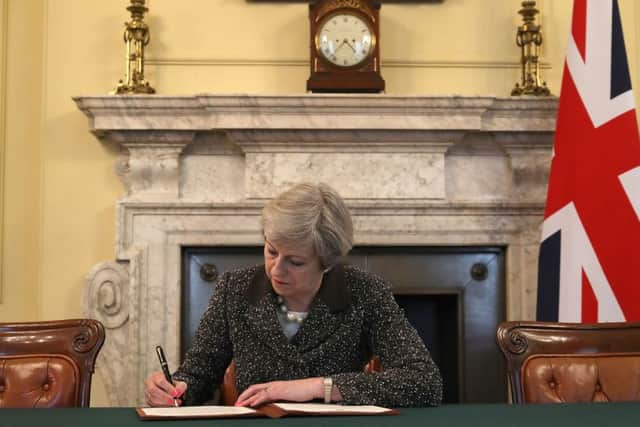Now it's official: May's signature triggers EU exit process


In a letter to European Council president Donald Tusk, Mrs May said the UK wanted a “deep and special partnership” with the future EU of 27, but restated her determination the UK should regain control of its borders, leave the single market and escape the jurisdiction of the European Court of Justice.
But she was accused of threatening the EU with a withdrawal of security collaboration, after the letter warned failure to reach agreement on trade would mean “our co-operation in the fight against crime and terrorism would be weakened”.
Advertisement
Hide AdAdvertisement
Hide Ad

Liberal Democrat leader Tim Farron described the warning as “utterly scandalous”, adding: “This letter is a blatant threat, security co-operation has been lumped together with trade.”
The six-page letter, signed in ink by the Prime Minister, was hand-delivered to Mr Tusk in his Brussels office by UK permanent representative Sir Tim Barrow at around 12.20pm just minutes before Mrs May made a statement to MPs on her plans.
Advertisement
Hide AdAdvertisement
Hide AdThe European Council president was the first officially to announce its receipt, posting a photograph on Twitter while Mrs May completed her weekly session of Prime Minister’s Questions in Westminster.


Mrs May told MPs the Government was acting on the democratic will of the British people with the “clear and convincing” support of Parliament by taking Britain out of the EU in what was one of “the great turning points in our national story”.
She issued a plea for “unity” following last year’s divisive referendum, so the nation can “together build a stronger, fairer, better Britain”.
Setting out Britain’s negotiating position in her letter, she made clear she wants a new trade deal to be negotiated at the same time as the “divorce deal” extricating the UK from its 44-year membership.
Advertisement
Hide AdAdvertisement
Hide AdAmid expectations the European Commission plans to present the UK with a £50 billion “divorce bill”, Mrs May said she was ready to discuss a “fair settlement” of Britain’s rights and obligations as a departing member, but gave no hint of the amounts she is prepared to contemplate.
She accepted the UK’s rejection of the EU principle of free movement of people meant it could not “cherry pick” the benefits of the single market.
And she said she was ready to agree an implementation period following the formal date of Brexit in 2019, to allow changes to business arrangements to be phased in gradually, avoiding a “cliff edge”.
In a 2,200-word letter, Mrs May used the word “partnership” 16 times and “co-operation” nine, but did not mention the word “compromise”.
Advertisement
Hide AdAdvertisement
Hide AdA sombre-faced Mr Tusk held up the letter at a Brussels press conference as he sent a farewell message to the UK: “We already miss you. Thank you and goodbye.”
The European Council president confirmed he would set out his draft negotiating guidelines on Friday, ahead of an extraordinary summit of the remaining 27 leaders on April 29 which is expected to pave the way for talks to begin in earnest in May.
Mr Tusk said the EU27 were “more determined and more united than before”, with a strong mandate to defend the EU’s interests in the “difficult” negotiations ahead.
But he said the invoking of Article 50 was not “a happy day” for him, for the European Union or for Britain, adding: “There is nothing to win in this process - and I am talking about both sides. In essence, this is about damage control.”
Advertisement
Hide AdAdvertisement
Hide AdLabour leader Jeremy Corbyn said Mrs May’s Brexit plans were “both reckless and damaging” as he warned his party “will not give this Government a free hand to use Brexit to attack rights, protections and cut services.”
Mr Farron said it was not too late for voters to change their mind and reverse the Brexit decision in a second referendum.
“The Prime Minister is twisting the will of the people, leaping into the abyss without any idea of where our country will end up,” said the Liberal Democrat leader.
“Democracy didn’t end on 23rd of June - and it hasn’t ended today either. The people can have their say over what comes next.”
Advertisement
Hide AdAdvertisement
Hide AdThe Scottish National Party accused Mrs May of breaking a promise to forge a “UK-wide approach” to Brexit before triggering Article 50.
SNP leader in Westminster Angus Robertson said: “Last year the Prime Minister promised that before she triggered Article 50 on leaving the EU, she would secure a UK-wide approach, an agreement with the governments of Scotland, Wales and Northern Ireland.
“Today the Prime Minister has triggered Article 50, and she has done so without an agreement. There is no agreement. Why has she broken her word and her commitment?”
European Parliament president Antonio Tajani said on Twitter: “Today isn’t a good day. #Brexit marks a new chapter in our Union’s history, but we’re ready, we’ll move on, hoping UK remains close partner.”